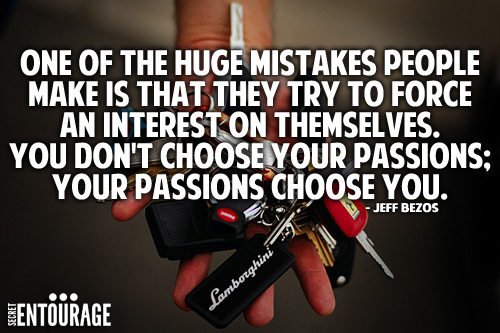In a recent discussion with Gary Swart, the former CEO of oDesk, today’s largest outsourcing platform, we discussed the importance of finding your passion in life and his take on it was quite interesting. His theory was quite simple and yet very powerful which is why I decided to share it. His theory on how to find your calling was…
Find something you are passionate about and find what you are good at, and then ask yourself if there is a market place for you to do what you want to do. Make sure you measure the total size of the market you are about to enter and have correct expectations of the cap of your business.
This simple process is exactly what I have helped many people do through the Third Circle Theory and Gary just shared with me the outcome of discovering your very own Third Circle. I was blown away when Gary re-enforced my belief that when past observations, skills, and passion comes together, true entrepreneurship is born.
So let me ask you this… have you found your crossroad yet?
If you haven’t then perhaps the next few paragraphs will evoke some thoughts that may help you get there. Lets break it down into the three categories that Gary brought up and how to identify each.
1. Find what you are passionate about: Passion is sometimes hard to decipher from love. There are many things we tend to fall in love with but rarely do we find something to hang on to. Ask yourself what some of the most common traits of your day-to-day activities are.
Many guys tend to think they are passionate about cars because they see themselves looking them up every minute or perhaps every time one drives by, but they fail to realize that their passion is not cars but rather the type of car, its characteristics and/or its design.
Narrowing down your understanding of what gets your heart pounding every time or what arguments you refuse to lose may give you perspective and direction in identifying your passion.
I, myself, find my passion through business but more specifically building brands and creating value for others. Although business is about money and profit, its not a correct portrayal of my passion, instead it is the creation of value for others through nothing that I find myself most engaged with which is why I teach entrepreneurship rather than how to make money.
Both go hand to hand but it is important to understand how to niche and really identify what you are passionate about rather than generalizing.
2. Find what you are really good at: That one should seem simple but it also isn’t. It actually requires some very important self-reflection (as described in Third Circle Theory). Identify how effective you are in your everyday tasks and ask yourself if you find yourself being the go-to person for certain things. Do random people say they were referred to you or do your friends come to you to discuss a specific topic each time? These are both different ways to identify value you bring to those around you based on your expertise or abilities above and beyond a normal person.
We all do these things everyday but make them part of our routine and sometimes think it is normal that we are as such, when in reality we have simply mastered a concept, skill, or process and have added our twist to simplify it.
When I was younger, like 16 years old I found myself really good at finding deals online and locally on car parts. While I had this in and saved money when buying parts, I realized I can help others who needs small things fixed or upgraded on their cars. I can save them money, make money, and expand my small car wash business into charging labor and parts for small repairs. When I realized my negotiating abilities were ultimately my strong point, I learned how to convert them into a useable trait for my business.
3. Is there a market for what you do: We covered the best ways to test your product or service prior to launching it in this article here and showed you ways to minimize your risk even further before jumping all in. In this particular case, you should understand your market even more prior to even testing.
Once you’ve identified your passion and what you are very good at, look at the total size of the market you want to take on, understand who owns the most market share and why. Identify their shortfalls so that you can take a competitive advantage quickly and build from their following that has yet to gain loyalty and can benefit from your positioning of your brand and what it stands for.
The important thing here is to understand the size of the scale prior to thinking of scaling. In other words, understand the potential so your expectations are accurate as to the possibilities.
If you want to become an author, do some research as to what today’s top authors make and how they make their money rather than just assuming every author is a millionaire just because their books are on the shelves of bookstores nationwide. By having a clear understanding of your market, how revenue models work and market caps, you are able to scale properly and hold clear measures of success.
These are the three main components broken down for you to find your very own crossroad and possibly perhaps spark enough interest to even take action on what you should have been doing years ago.
